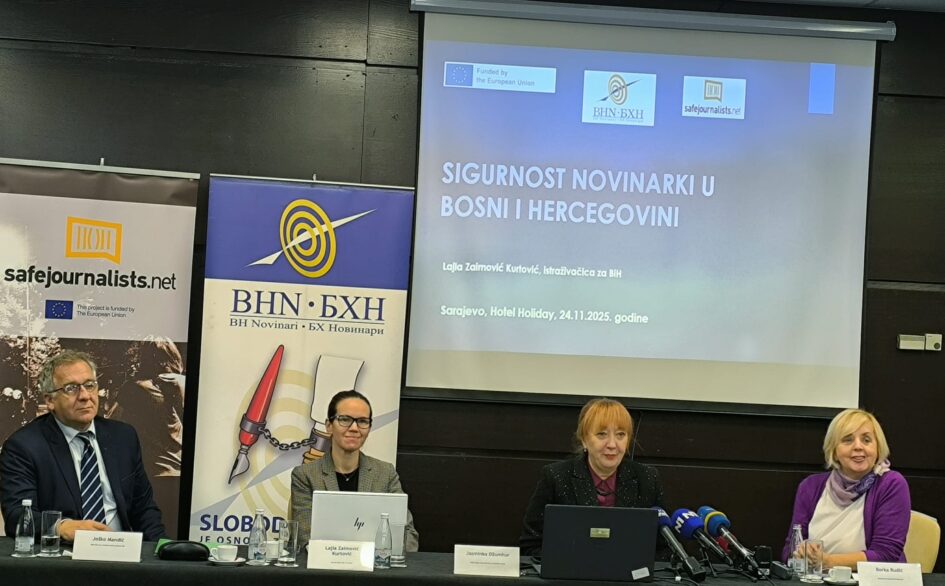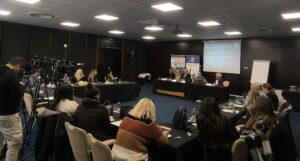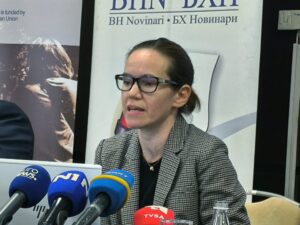
Sarajevo, 24 November 2025 – The BH Journalists Association presented today the results of a comprehensive study titled “Safety of Women Journalists in Bosnia and Herzegovina”, conducted with the support of the European Union within the regional SafeJournalists project. The research provides an in-depth insight into the forms of professional and gender-based violence faced by women journalists in BiH, as well as an analysis of existing protection mechanisms and their key shortcomings.
 The study shows that women journalists in BiH are exposed daily to various forms of violence – from verbal attacks and online threats to physical assaults – often with a pronounced gender-based dimension. Between early 2021 and the end of 2024, a total of 132 attacks on journalists were recorded, 31 of which were directly targeted at women journalists, while 21 incidents were directed at groups of journalists. However, the actual number of attacks is significantly higher, as most women journalists do not report the violence they experience due to distrust in institutions and fear of being perceived as victims.
The study shows that women journalists in BiH are exposed daily to various forms of violence – from verbal attacks and online threats to physical assaults – often with a pronounced gender-based dimension. Between early 2021 and the end of 2024, a total of 132 attacks on journalists were recorded, 31 of which were directly targeted at women journalists, while 21 incidents were directed at groups of journalists. However, the actual number of attacks is significantly higher, as most women journalists do not report the violence they experience due to distrust in institutions and fear of being perceived as victims.
“This is the first report of its kind produced by BH journalists within the regional Safejournalists network. The aim of the research is to open the topic of violence against women journalists and to initiate a public debate on protecting their safety, given that violence against them is not always recognized as gender-based violence, and to jointly explore how to find adequate mechanisms that will contribute to greater safety and better working and legal conditions for women journalists,” says Borka Rudić, Secretary General of BH Journalists.
 Women working in the media are often targeted by various forms of gender-based violence that profoundly endanger not only their professional work, but also their mental and physical health and well-being, stated Lajla Zaimović Kurtović, researcher on the project and author of the report. Although Bosnia and Herzegovina has a legal framework that covers issues of criminal responsibility, non-discrimination, violence prevention, and gender equality, there is still no law that protects victims of gender-based violence outside the context of domestic violence, nor a law that ensures specific professional protection for journalists. An additional challenge is the lack of harmonisation of national legislation with the Istanbul Convention.
Women working in the media are often targeted by various forms of gender-based violence that profoundly endanger not only their professional work, but also their mental and physical health and well-being, stated Lajla Zaimović Kurtović, researcher on the project and author of the report. Although Bosnia and Herzegovina has a legal framework that covers issues of criminal responsibility, non-discrimination, violence prevention, and gender equality, there is still no law that protects victims of gender-based violence outside the context of domestic violence, nor a law that ensures specific professional protection for journalists. An additional challenge is the lack of harmonisation of national legislation with the Istanbul Convention.
“The number of attacks on women journalists in BiH has been increasing over the past years, both in the field and within newsrooms. The most commonly recorded forms of violence reported by women journalists are verbal and online threats, which are often gender-based, while male journalists, in addition to threats, more frequently face physical assaults. Women journalists are exposed to violence both because of their gender and because of the work they do. Despite the detailed legal and international framework in BiH that can regulate these issues, the problem lies in its inadequate implementation. Some progress has been made in the past two years with the appointment of focal points in Prosecutor’s Offices and police agencies across BiH, tasked with improving the safety of journalists. However, journalists remain dissatisfied with the effectiveness of investigations, and a particular concern is online violence, which still in many ways represents a grey area and is not sufficiently regulated by law”, said Lajla Zaimović Kurtović.
The general perception among women journalists is that they are more exposed to violence than their male colleagues, and that this violence often contains gender-based elements. Women journalists are also more frequently exposed to violence while working in the field than in newsrooms. The individuals from whom women journalists feel most threatened are politicians and people in positions of power, as well as individuals involved in criminal activities who may be endangered by investigative journalism.
 Joško Mandić from the Agency for Gender Equality of Bosnia and Herzegovina emphasizes that the research conducted by BH Journalists has effectively identified the problems domestic institutions face in preventing gender-based violence and prosecuting the perpetrators of these criminal acts.
Joško Mandić from the Agency for Gender Equality of Bosnia and Herzegovina emphasizes that the research conducted by BH Journalists has effectively identified the problems domestic institutions face in preventing gender-based violence and prosecuting the perpetrators of these criminal acts.
“It is necessary to work more on the system of protection for women who are exposed to multiple forms of discrimination, which also includes women journalists who require special attention from the perspective of protection under the Istanbul Convention. In the past year, certain progress has been made in introducing new legal norms in this area, but continuous work is needed, and that is our obligation”, Mandić said.
According to Jasminka Džumhur, the Human Rights Ombudsperson, most laws have already been adopted, but the problems lie within the institutions, their capacities, and the lack of clear procedures.
“In terms of legislation, the situation is not encouraging, especially over the past two years. For example, we have begun to accept as fact that the Law on Protection from Discrimination has been abandoned in the Republic of Srpska. I want this report we are presenting today to serve only as a starting point for future reports in which we will, in addition to focusing on the victims of attacks, also focus on the perpetrators and publicly shame them, so that we can see what kind of people they are”, Džumhur emphasized.
Through focus groups, interviews, and an analysis of institutional practices, the research offers a series of recommendations aimed at improving the safety of women journalists in BiH. Key recommendations include:
Recommendations for media and media organizations:
- launching campaigns to raise awareness about risks and available support mechanisms;
• developing gender-sensitive newsroom policies;
• stronger advocacy for regulating online violence;
• initiating legal amendments that would grant journalists the status of persons performing work of public interest.
Recommendations for institutions:
- regulating online violence and harmonizing relevant legislation at all levels;
• strengthening the implementation of laws on protection from gender-based violence;
• aligning domestic legislation with international standards;
• amending criminal legislation to define the status and improve the protection of journalists.
The presented findings once again highlight the urgent need for systemic solutions that will ensure a safer professional environment for women journalists in Bosnia and Herzegovina.
With this event, BH Journalists joined the celebration of November 25th – International Day for the Elimination of Violence against Women and the campaign “16 Days of Activism against Gender-Based Violence”. In the campaigns, BH Journalists will promote the findings of this research and publish statements from 16 female journalists about their strategies and models of combating professional and gender-based violence to which women in the media are exposed on a daily basis.
Author: Maja Radević
Phto by: BHJA, private archive



